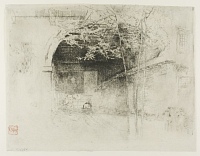Traghetto | ||
| Number: | 231 | |
| Date: | 1879/1880 | |
| Medium: | etching and drypoint | |
| Size: | 240 x 311 mm | |
| Signed: | butterfly at lower left (1-2); replaced with new butterfly (3-final) | |
| Inscribed: | no | |
| Set/Publication: | no | |
| No. of States: | 4 | |
| Known impressions: | 7 | |
| Catalogues: | K.190; M.187 | |
| Impressions taken from this plate (7) | ||
STATE
Four states are known.
State 1

Signed with a butterfly on the wall at lower left.
Only three sides of the window frame at upper right are clearly indicated; two faint figures stand by the right entrance to the archway, with shading near the left leg of the one more clearly delineated.
State 2

New shading is added to the window frame at upper right, and the window panes are more fully drawn; short diagonals are added to the shading above the lower window at right; the faint figures and a patch of shading by the right entrance to the archway are removed; pale lines are added to the view of the canal in the background, to right of the seated figure.
State 3

Signed with a faint butterfly, in outline, on the wall at lower left; the original butterfly has been removed.
The window to left of the archway is removed and replaced with the faint outlines of another, with a branch across it, slightly further to the left; there are more additions to the view of the canal in the background; many lines of shading within the passage are reduced or removed; three seated men and a chair at the passageway entrance are drawn lightly in drypoint at lower right.
State 4

The butterfly signature is worn and barely visible.
The window at the left and the branch across it are more clearly defined and partly shaded; fine diagonal shading is added on the lower wall beneath the window; the seated figure in the background is removed, along with most detail in the distance; new shading is added around the lantern and on the pavement within the passageway, which now shows many rows of paving stones.
The only known example of this state, illustrated here, is a fragment of the left side of the etching. It was among the contents of Whistler's studio bequeathed to the Hunterian Art Gallery by Rosalind Birnie Philip (1873-1958).
